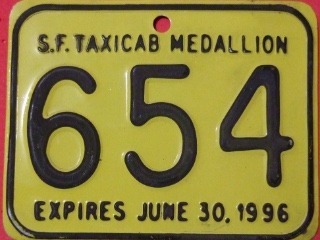Maven Clinic launches program for members who want to get pregnant without IVF
The company also expanded access to 12 different provider types for male fertility care
Read more... Taxis refuse to die.
Taxis refuse to die.
California’s Division of Measurement Standards, which regulates commercial measuring devices like taxi meters, today approved Flywheel’s TaxiOS technology for cabs. Essentially, this means traditional taxis can replace their antiquated metering, dispatch, navigation, and payment systems with a “smart,” cloud-enabled smartphone meter resembling what you see in Lyft and Uber cars.
The decision is a big win for Flywheel and the taxi companies they serve, as the service is currently available in most major west coast cities, including San Francisco, Los Angeles, Seattle, San Diego, Sacramento and Portland. The green lighting of TaxiOS followed a successful pilot program in San Francisco, jointly initiated by Flywheel and the city’s municipal transportation agency (SFMTA).
Flywheel is pleased with the news, believing it to be an important step toward bringing “a level playing field” to a market increasingly dominated by black cars and pink mustaches.
“A smartphone in every car is the only way to advance the taxi industry,” said Flywheel CEO Rakesh Mathur, “and we now have a mobile platform that can replace every expensive and outdated piece of taxi hardware, while making drivers and fleets more money than ever before.”
Even beyond today’s ruling, Flywheel has been a crucial technology partner for taxis in their struggle against ride-hailing upstarts Lyft and Uber. Mostly, Flywheel simply puts forth all the advantages of taking a taxi in the city.
For one, there’s the perception that taxi drivers actually know their way around the city, instead of blindly following wherever Google Maps or Waze lead them. Then there’s the lack of surge pricing, a tactic used by both Lyft and Uber when there’s high demand for cars. And then there’s the no-nonsense approach to getting passengers from A to B; Flywheel even took a jab at Lyft’s Justin Bieber promotion by tweeting “Flywheel, 100 percent Bieber and surge free.”
Taking its partnership with the tech firm one step further, San Francisco's oldest taxi company (DeSoto Cab) earlier this year signed a co-marketing agreement with Flywheel. This allowed the taxi company to officially rebrand itself as Flywheel, including painting over its blue and white fleet with Flywheel’s orange. The cab company pays the expenses for the paint job so that San Franciscans know they can hail the cab through their phone, and Flywheel gets free citywide advertising instantly.
Though only available on the west coast today, Flywheel tells VatorNews that they’re hoping to bring the GPS-based virtual meter pilot to New York City. Though its ride-hailing competitors, Uber and Lyft, have a head start with major penetration in most U.S. cities, Flywheel technically already has a driver workforce to tap into: every traditional taxi on the street.
The company also expanded access to 12 different provider types for male fertility care
Read more...Ezra's AI cancer screening platform will be available in 150 RAYUS locations
Read more...Foggy uses the Taptic Engine in Apple Watch to provide vibrotactile stimulation for gait freezing
Read more...Startup/Business
Joined Vator on
Lyft is a peer-to-peer transportation platform that connects passengers who need rides with drivers willing to provide rides using their own personal vehicles.
Startup/Business
Joined Vator on
Uber is a ridesharing service headquartered in San Francisco, United States, which operates in multiple international cities. The company uses a smartphone application to arrange rides between riders and drivers.
